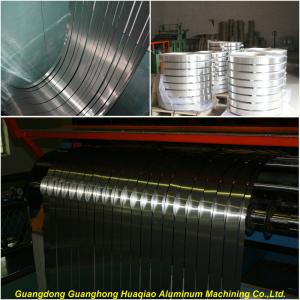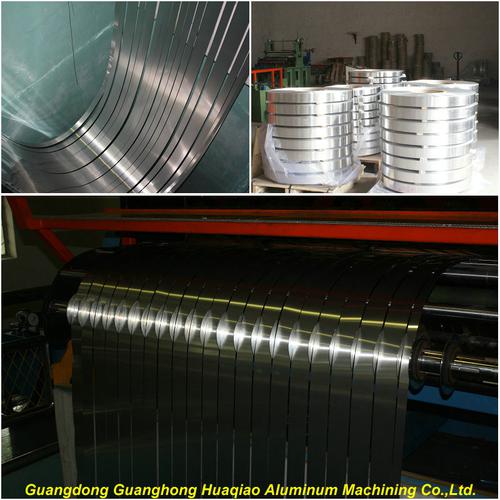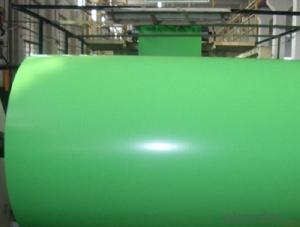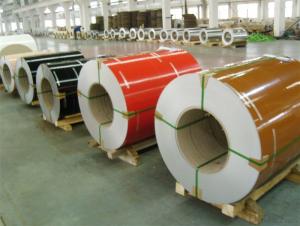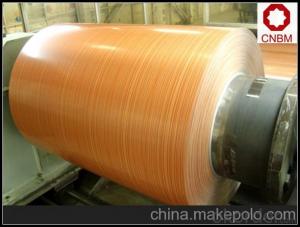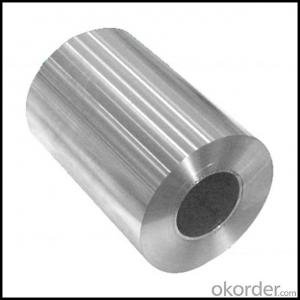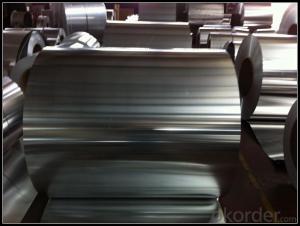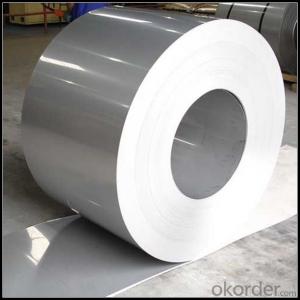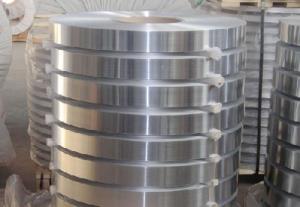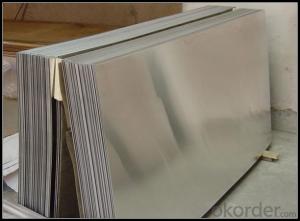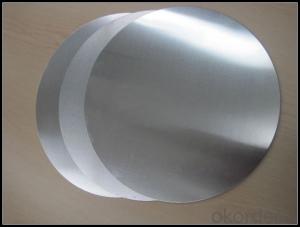Aluminum Coils Inc Tampa Fl Aluminum Slitting Roll Strips
- Loading Port:
- China Main Port
- Payment Terms:
- TT OR LC
- Min Order Qty:
- -
- Supply Capability:
- -
OKorder Service Pledge
OKorder Financial Service
You Might Also Like
PE Aluminum Coating Coils for ACP
Features of PE Aluminum Sheet:
1. Adopting precision rolling coatingtechnology, our PVDF and PE coated coil can ensure excellent adhesive withoutcoating omission.
2. For the PE coated aluminum coil weproduced, there are various colors for your choice.
3. Using infrared heating technology toprotect environment from pollution.
4. Our coated aluminum coil has four-rollercoating line, uniform coating thickness and good features.
RawMaterial of the PE Aluminum Coating Coils:
1.Aluminum Coil: high strength aluminum with alloy of AA1100 (aluminum alloy isavailable with AA3003, AA3005, AA5005 according to customer)
2. SurfacePaint: PE, PVDF and special paints.
Specificationof PE Aluminum Coating Coil
Width:20mm~1590mm
Thickness:0.06mm~1.0mm
ExternalDiameter: ≤ 1500mm
InternalDiameter: 405mm, 505mm, 150mm, 75mm
Coilweight: ≤ 4000kg
PE coatedaluminum coil is processed through the technics of roller coating and bakingwith precise polyester paints. Its color is glossy and with variety of colorsenabling you to choose easily. Chromatic aberration is small, impact resistanceis strong and easy to be processed, and all its performance has reached orsurpassed the national criteria. The products are widely used in indoor anddoor decoration, ceilings, room surface tiles, corrugated boards, wall panels, advertisement boards, counters,home appliances, decoration in and out of autos and boats.
Performanceof the coating
Aluminum Thickness | Coating Thickness | MEK | T- Bend | Impact | Adhesion | Pencil Hardness | Boiling Water Proof |
0.3-1.5mm | ≥18μm | ≥100 Times | ≤2T | 50 kg•cm | 0 Grade | ≥HB | no change within 2 hours |
0.2-0.28mm | ≥18μm | ≥100 Times | ≤2T | 30kg•cm | 0 Grade | ≥HB | no change within 2 hours |
0.15-0.18mm | ≥18μm | ≥100 Times | ≤3T | 20 kg•cm | 0 Grade | ≥HB | no change within 2 hours |
0.08-0.12mm | ≥16μm | ≥80 Times | ≤4T | 10 kg•cm | ≤1 Grade | ≥HB | no change within 1 hour |
0.022-0.06mm | ≥12μm | ≥50 Times | - | - | ≤1Grade | ≥HB | no change within1 hour |
Colorof Card
PE (polyester)
PE
ColorMatch
For custom' color requests, we can deal as following:
1. Supply a physical sample of custom color. A color sample on metal ispreferred. If other, it is also acceptable. But the color matching rate may benot good as color on metal.
2. New color sample is usually offered by our paint supplier in 5-7 days,special color should be in 7-10 days.
3. Upon receipt of color sample, please approve in writing as soon as possible.Once you approved, we will arrange purchasing and production.
Note: Color difference maybe occurred in different production batch, so it issuggested all panels are placed in one order for same project. And keep samedirection as arrow on protective film when installing to avoid any colordifference by vision
- Q: Can aluminum coils be used for food processing conveyor systems?
- Yes, aluminum coils can be used for food processing conveyor systems. Aluminum is a popular choice for conveyor systems in the food processing industry due to its various beneficial properties. Firstly, aluminum is a lightweight material, which makes it easier to install and transport. This is particularly important for conveyor systems that may require frequent reconfiguration or relocation. Additionally, aluminum has excellent corrosion resistance, which is crucial in food processing environments where exposure to moisture, chemicals, and food particles is common. Furthermore, aluminum is a hygienic material that is easy to clean and maintain, ensuring food safety standards are met. Lastly, aluminum coils can be easily formed and customized to fit specific conveyor system requirements, allowing for efficient and effective food processing operations. Therefore, aluminum coils are a suitable choice for food processing conveyor systems.
- Q: What is the price range of aluminum coils?
- Aluminum coil prices can fluctuate depending on a range of factors including thickness, width, alloy type, and market conditions. Typically, the price range for aluminum coils can begin at $1 per pound for thinner gauge coils and can rise to $3 per pound or more for thicker gauge coils or specific alloys. It is crucial to understand that these prices are estimated and subject to change based on market demand, availability, and other economic influences. To obtain accurate and current pricing information, it is advised to reach out to suppliers or refer to market research reports.
- Q: What is the hardness of aluminum coils?
- The hardness of aluminum coils can vary depending on a few factors such as the specific alloy used and the tempering process applied. Generally, aluminum coils have a relatively low hardness compared to other metals. Aluminum is known for its lightweight and malleable properties, making it easy to bend and shape. However, through various heat treatment processes like annealing or cold working, the hardness of aluminum coils can be increased to meet specific requirements. It is important to note that the hardness of aluminum coils may also vary depending on the intended application and the desired level of strength and durability.
- Q: What maintenance is required for aluminum coils?
- Regular maintenance for aluminum coils includes cleaning, inspecting for damage or corrosion, and ensuring proper airflow around the coils. Additionally, it is important to check the refrigerant levels and ensure that the coils are not blocked by dirt or debris.
- Q: How are aluminum coils used in the production of aircraft components?
- Aluminum coils are used in the production of aircraft components as they can be easily formed, shaped, and joined together to create various parts such as fuselage panels, wings, and structural elements. The coils are typically processed through a series of steps including cutting, bending, and welding to fabricate these components. The lightweight and high strength properties of aluminum make it an ideal choice for aircraft applications, as it helps to reduce the overall weight of the aircraft while maintaining structural integrity.
- Q: Can aluminum coils be used for seamless gutters?
- Yes, aluminum coils can be used for seamless gutters. Aluminum is a popular choice for gutter systems due to its durability, lightweight nature, and resistance to corrosion. Aluminum coils are commonly used to create seamless gutters, which offer several advantages over traditional sectional gutters. Seamless gutters are custom-made on-site, ensuring a perfect fit for the specific dimensions of the building. This eliminates the need for seams, which can be prone to leaks and require regular maintenance. Additionally, aluminum is easy to work with, allowing for seamless gutters to be formed into various shapes to accommodate the unique design of a building. Overall, aluminum coils are a practical and efficient option for creating seamless gutters.
- Q: I bought some cheap aluminum foil, but one weighs much less than the other brand for the same thickness and length, why?What is the other made of? Is it still good to use for grounding something?Thank you.
- Aluminum foil is aluminum foil, it has nothing but aluminum in it. One of them is misstating the thickness, or you are mistaken about the weight or width.
- Q: Can a rolling machine be utilized to transform aluminum coils into flat sheets?
- <p>Yes, you can use a rolling machine to roll aluminum coils into sheets. Rolling machines are specifically designed to apply pressure and reduce the thickness of metal coils, such as aluminum, into thinner, flatter sheets. The process involves passing the aluminum coil through the rolling mill, where it is compressed between rollers. This process can be repeated to achieve the desired thickness and flatness of the aluminum sheet. It's important to ensure the rolling machine is suitable for aluminum and that the appropriate settings are used to avoid damaging the material or the machine.</p>
- Q: Can aluminum coils be used in electrical wiring applications?
- Yes, aluminum coils can be used in electrical wiring applications. Aluminum has been used as a conductor in electrical wiring for many years, especially in residential and commercial buildings. It is a lightweight and cost-effective alternative to copper. Aluminum coils are commonly used in applications such as power distribution, transformers, and motors. However, it is important to note that aluminum has different electrical and mechanical properties compared to copper, so proper installation techniques and connectors specifically designed for aluminum wiring should be used to ensure safety and efficiency.
- Q: Can aluminum coils be used in the production of heat sinks?
- Yes, aluminum coils can be used in the production of heat sinks. Aluminum has excellent thermal conductivity, making it an ideal material for heat dissipation. Coiling the aluminum into a specific shape allows for increased surface area, enhancing the heat transfer capabilities of the heat sink.
Send your message to us
Aluminum Coils Inc Tampa Fl Aluminum Slitting Roll Strips
- Loading Port:
- China Main Port
- Payment Terms:
- TT OR LC
- Min Order Qty:
- -
- Supply Capability:
- -
OKorder Service Pledge
OKorder Financial Service
Similar products
Hot products
Hot Searches
Related keywords
